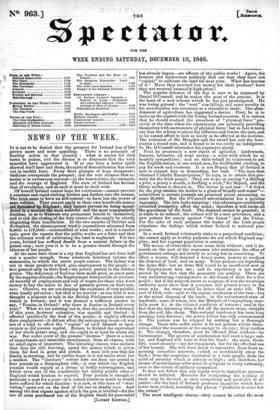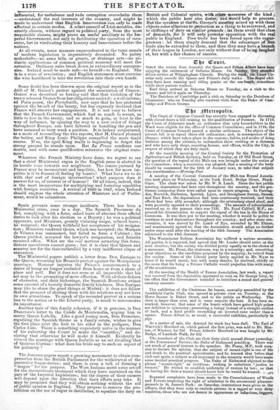NEWS OF THE WEEK.
IT is not to be denied that the prospect for Ireland has of late grown more and more appalling. There is no principle of healthy action in that country : what is meant for food turns to poison, and the disease is so desperate that the very remedies have aggravated it. If at one time a better spirit showed itself here and there, the spirit of demoralization has come out in tenfold force. Every faint glimpse of hope disappears; darkness overspreads the prospect; and the sole reliance that re- mains is in extraneous succour—in the benevolence, the strength, and the courage of England. The state of Ireland has become that of revolution, and as such it must be dealt with. Of herself Ireland cannot hope for extrication—cannot prevent a constant and rapid sinking further and further into the morns. The lrish seem to have no self-control—to have lost the power of sane volition. They cannot apply to their own benefit the money aid furnished by England; they cannot prevent its being squan- dered in a manner the most wasteful and the most transparently fruitless, so as to frustrate any permanent benefit to themselves, and to risk the closing of the very source of the supply by utterly; disgusting their benefactors. In the two months of October and, November, the eIeembsynaryweekly expenditure advanced from 6,000/. to 117,0001.—nineteenfold in nine weeks ; and in a similar ratio grow the reports that the public works are a farce and that the ordinary work of cultivating the land is neglected. For tw.o years, Ireland has suffered dearth from a natural failure in the potato crop ; next year it is to be a greater dearth through the idleness of her people. At the same time there is a cry that England has not done half nor a quarter enough. Some wholesale falsehood vitiates the statements, in which the entire people concur. The failure was not in those proilucts which give employment to the people : it was general only ilk their food—the potato, partial in the inferior grains. The deficiency of food has been made good, in great part, by the supplies of maize; the Employment Acts provide an unwont- ed security, of employment and rate of wages for those who want money to buy the maize in lieu of potatoes grown on their con- acre. Observe, we are not denying the existence of very painful, even deadly privation ; but that is no novelty : at one time it was thought a ma/aerie to talk in the British Parliament about star- vation in Ireland ; and it was deemed a sufficient answer to say, "Famine in Ireland! why there is famine in Ireland every year." What we are pointing out is, that the peculiar deficiency of this year, however extensiveit affected specifically the food of ' was specific and limited : the people; it slightly affected their employment—it did not affect the rent-paying crops:—it was not of a kind to affect the "capital" of such farmers or land- owners as did possess capital. Return to Ireland the equivalent of her whole potato crop, and she ought to at least be where she was. But under cover of the general "distress" there is a howl of importunate and insatiable mendicancy, from all classes, with no small signs of imposture. The labouring classes, who exclaim that they are still starving, spend the money which is given them for food in guns and pistols. A man tells you that his family is starving, and he carries home to it not maize meal but a musket. The 'destitute" cottier lays out from one pound to four pounds on a Birmingham rifle,—a sum which the English peasant would regard as a dream of lordly extravagance, and which even one of the comfortable but thrifty middle class of England would hesitate to expend. Four pounds is enough to maintain a man for a year—it is indeed almost as much as would have sufficed for whole families: it is now, at this time of "star- vation," spent not on the food of life but on deadly toys. And among the first objects against which the gun is levelled—for the use of arms pm-chased out of the English funds for poor-relief
has already begun—are officers of the public works I Again, the farmers and landowners suddenly find out that they have not "capital" to cultivate the land for next year. What has become of it Have they received less money for their produce? have they not received unusually high prices?
The popular delusion of the day is sure to be improved by Daniel O'Connell, and he makes the most of the present. It is the basis of a new scheme which he has just promulgated. He was losing ground ; the "rent" was falling, and some novelty in, his merchandise was necessary as a stimulus to trade. The aban- donment of agriculture has suggested a device. First, he is to make up the quarrel with the Young Ireland seceders. It is curious that he should readmit the preachers of "physical force " pre- cisely at the time when his countrymen are generally providing themselves with instruments of physical force : but in fact it turns. out that the schism weakens his influence and lowers the rent, and so he cannot afford to look so nicely as he affected at the doctrine. The extrusion of Mr. Meagher and the sword has cost the Asso- ciation a round sum and is found to be too costly an indulgence., So Mr. O'Connell retrenches his expensive nicety. Next he propounds a new object of agitation : landowners, farmers, labourers, all want money—a want with which he so heartily sympathizes ; and on their behalf he volunteers to ask the English nation, in one round sum, for 30,000,0001. sterling, to pay for seeds and etceteras. It is not Repeal that all Ireland is now to support him in demanding, but cash. "The man that obtained Catholic Emancipation," he says, is to obtain this gra- tuity for the Irish people. They are to go on paying "a shilling a year, a pennya month, a farthing a week," for Repeal, and the. thirty millions is thrown in. The device is not new : "A ticket for the play entitles the holder to a glass of brandy-and-water" subacribers to certain journals are promised prizes amounting to some 20,000/. But the O'Connell advertisement has a peculiar ingenuity. The bait looks tempting : vast advantages confidently promised irresistibly affect the mind ; therefore it will incite all the c.,0-reedinese s=of the Irish. The demand cannot be granted; it -
to be refused ; the refusal will be a new grievance, and a - atew. pretext for outcry against "the Saxon" and the Union., For the sake of such purposes the leader of the Irish people stimulates the feelings which reduce Ireland to national pau- perism. In a word, Ireland voluntarily sinks to a pauperized condition; she cannot apply to worthy purposes the aid which England sup- plies; and her vagrant population is arming.
'The means of extrication must come from without ; and it de- mands on the part of the statesmen who undertake the office of government courage not merely in acting but in conceiving. To ' effect a rescue, will demand a heavy purse, powers to readjust' the disposal of land; and an army. Some persons are regretting the Arms Bill: but an Arms Bill would be as insufficient now as the' Employment Acts are ; and its expediency is not really proved by the fact that the peasantry are arming. There are very embarrassing contingencies to the denial of arms for a free people : but if the subjects resort to weapons of war the sovereign authority must show that it possesses still greater power in the same way. An army would be better than an arms bill. The root of Irish evils—next to the supine tendencies of the race—lies in the actual disposal of the lands in the embarrassed state of landlords, some of whom, like the lands; of Conyngham, man- fully avow it ; in the vitiated condition of tenures ; and in the fact that the labouring class is fed off the poorest crops, straight from the iioil, like sheep. This national insolvency has been long - pending, long foreseen ; the potato failure has only consummated it. The process can be stopped by nothing but a thorough change. Those who suffer under it do not possess within them- selves either the resources or the energy to change ; they confess it. The change, therefore, must be effected from without—by Government. The process of amelioration will need a large out.. lay, and England will have to find the funds : she must, there- fore exact security—not for repayment, but for the effectual use of her bounty. She will have much to encounter, from fears re- specting immediate interests, (which so inordinately sway the Irish,) from the suspicions incidental to a rude people, from the spirit of anarchy which is already so high ; and, therefore, her means of maintaining order must be adequate to every extremity, even to the extent of military occupation.
It does not follow that any injury even to immediate interests should be inflicted. Measures for readjusting the holding of lands may be devised, at once compulsory and profitable to all parties—for the land of Ireland possesses capacities which have never been evoked, inverting the phrase "profitable to none but the owner."
The most intelligent classes—they cannot be called the most
influential, for turbulence and rude corruption overwhelm them —understand the real interests of the country, and might be made to understand that English intervention can only be made effectual in certain modes. A select council of Irish notables, dis- creetly chosen, without regard to political party, from the most responsible classes, might prove an. useful auxiliary to the Ian- penal Government, not only in facilitating the operation of mea- sures, but in vindicating their honesty and benevolence before the nations.
At all events, some measure unprecedented in the tame annals of modern legislation is imperatively demanded. No paltry makeshifts—no arms bills, or grants, or drainage acts—no pe- dantic applications of common political economy will meet the occasion. Ordinary rules break down in extraordinary emergen- ties. Ireland must be made safe—to herself—to England. She M in a state of revolution ; and English statesmen must exercise the wise hardihood to take the revolution into their own hands.



























